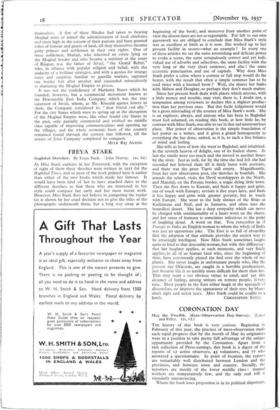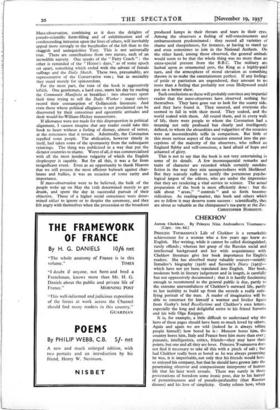CORONATION DAY
May the Twelfth. Mass-Observation Day-Survey. (Faber and Faber. 12s. 6d.)
THE history of this book is very curious. Beginning in February of this year, the practice of mass-observation made such rapid progress that by the month of May its originators were in a position to take pretty full advantage of the unique opportunity provided by the Coronation. Apart from a rich collection of Press-cuttings, this book is a digest of the reports of 12 active observers, 43 volunteers, and 77 who answered a questionnaire. In point of location, the reports are remarkably well distributed between London and the provinces, and between town and country. Socially, the reporters are mostly of the lower middle class : manual workers are comparatively few, and the only real toff is singularly unconvincing.
Where the book loses proportion is in its political alignment. Mass-observation, combining as it does the delights of pseudo-scientific form-filling and of exhibitionism and of condescending intrusion upon the lives of others, will inevitably appeal more strongly to the busybodies of the left than to the sluggish and uninquisitive Tory. This is not universally true. There are contributions from two nurses, each of an incredible naivety. One speaks of the " Fairy Coach " : the other is reminded of the " Historfe days," as of some epoch set apart, something which ended with the advent of female suffrage and the Daily Sketch. These two, presumably, are representative of the Conservative vote ; but in mentality they stand merely for spinsterdom.
For the most part, the tone of the book is aggressively leftish. One gentleman, a hard case, starts his day by reading the Communist Manifesto at breakfast : two observers spent their time trying to sell the Daily Worker : many others record their consumption of Gollanczish literature. And even those whose political allegiance is not proclaimed can be discovered by their censorious and egocentric attitudes and their would-be-William-Hickey mannerisms.
If allowance were not made for this disproportion in political alignment, I cannot imagine that any reader could take this book to heart without a feeling of dismay, almost of terror, at the rottenness that it reveals. Admittedly, the Coronation repelled some people. The abdication, however timely in itself, had taken some of the spontaneity from the subsequent rejoicings. The thing was publicised in a way that put the dictator countries to shame. Worst of all, it was commercialised with all the most insidious vulgarity of which the English shopkeeper is capable. But for all this, it was a far from insignificant event. Even as an opportunity to thank Heaven that we still possess the most efficient bulwark against char- latans and bullies, it was an occasion of some rarity and importance.
If mass-observation were to be believed, the bulk of the people woke up on May the izth determined merely to get drunk, and spent the day in successful pursuit of their objective. Those of a higher social conscience were deter- mined either to ignore or to despise the ceremony, and they felt angry with themselves when the procession or the broadcast produced lumps in their throats and tears in their eyes.
Among the observers a feeling of self-consciousness and embarrassment predominated : they record all varieties of shame and sheepishness, for instance, at having to stand up and even sometimes to join in the National Anthem. On the other hand, among those observed, the general attitude would seem to be that the whole thing was no more than an extra-special present from the B.B.C. The military are looked upon as ornamental pets, the King as a highly-paid turn, and the atmosphere of moral elevation as something thrown in to make the entertainment perfect. If any feelings of pride or patriotism are engendered, they amount to no more than a feeling that probably not even Hollywood could put on a better show.
Such conclusions as these will probably convince any impartial reader that the mass-observers have observed nothing but themselves. They have gone out to look for the seamy side, and they have found it. They sneered, and everyone else seemed to fall in with their mood. They soaked, and the world soaked with them. All round them, and in every walk of life, there were people to whom the Coronation had a meaning not only profound but clearly and intelligently defined, to whom the absurdities and vulgarities of the occasion were an inconsiderable trifle in comparison. But little of this more serious aspect of the occasion entered into the per- ceptions of the majority of the observers, who reflect an England flabby and self-conscious, a land afraid of hope and ashamed of glory.
This is not to say that the book is not very entertaining in some of its details. A few inconsequential remarks and traits of character are recorded which certainly outshine fiction in the way they mix unexpectedness with likelihood. But they scarcely suffice to justify the portentous psycho- logical jargon of the editors, who are under the impression that they are rendering a vital service to science. The actual preparation of the book is most efficiently done : but the talk about " areas," " controls " and so forth becomes ridiculous. As reading-matter, this book and others which are to follow it may deserve some success : scientifically, they are about as valuable as the chimpanzee's tea-party at the Zoo.
CHRISTOPHER HOBHOUSE.

















































































































 Previous page
Previous page